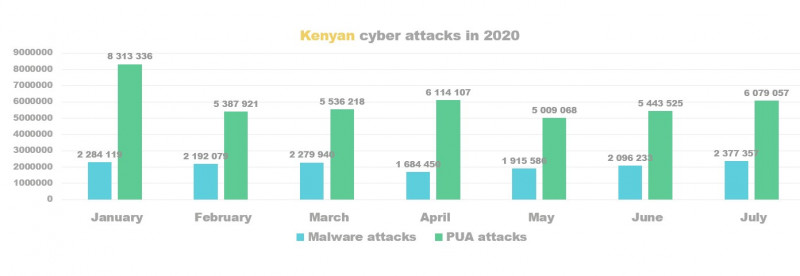Kaspersky Reports Increased Cyber Attacks in Kenya
The country has faced around 14 million malware attacks and 41 million PUA appearances

Kaspersky has reported an increased number of cyber-attacks in Kenya in 2020. In a new report, Kaspersky notes that the country has faced around 14 million malware attacks and 41 million appearances of Potentially unwanted applications (PUAs) from January to July.
PUAs are programs usually not considered to be malicious by themselves but negatively impact the user experience.
These programs can, for instance, include adware, which bombards the user with intrusive ads or downloaders that download various other programs, which may consist of malicious ones.
“These numbers show that it’s not only the malware that attacks users but also the “grey zone” programs that grow in popularity and disturb their experiences, while users might not even know it is there,” the firm says.
Africa’s threat landscape activity shows PUAs attack users four times more often than traditional malware, according to interim results by Kaspersky researchers.
The report also includes two other African countries, including South Africa and Nigeria. However, in Kenya and South Africa, the threat landscape is “more intense.”

(Source: Kaspersky)
In South Africa, the team reported almost 10 million malware attacks and a staggering 43 million PUA detections. In Nigeria, the malware attacks were 3.8 million with 16.8 million PUA detections. That’s way less than the numbers recorded in Kenya and South Africa.
Explaining the reason behind increased PUA attacks, termed as “grey-zone” software, Denis Parinov, a security researcher at Kaspersky, says PUAs are “harder to notice at first and that if the program is detected, its creators won’t be considered to be cybercriminals.”
“The problem with them is that users are not always aware they consented to the installation of such programs on their device and that in some cases, such programs are exploited or used as a disguise for malware downloads.”
The solution to this is grabbing a security solution that will notify users of their presence by flagging them.
Follow us on Telegram, Twitter, Facebook, or subscribe to our weekly newsletter to ensure you don’t miss out on any future updates.



